Bungie on old Drifter, getting that Star Wars blend just right, bugs, and more in Destiny 2: Renegades
We sat down with Assistant Game Director Robbie Stevens and Narrative Director Alison Lührs at Bungie HQ
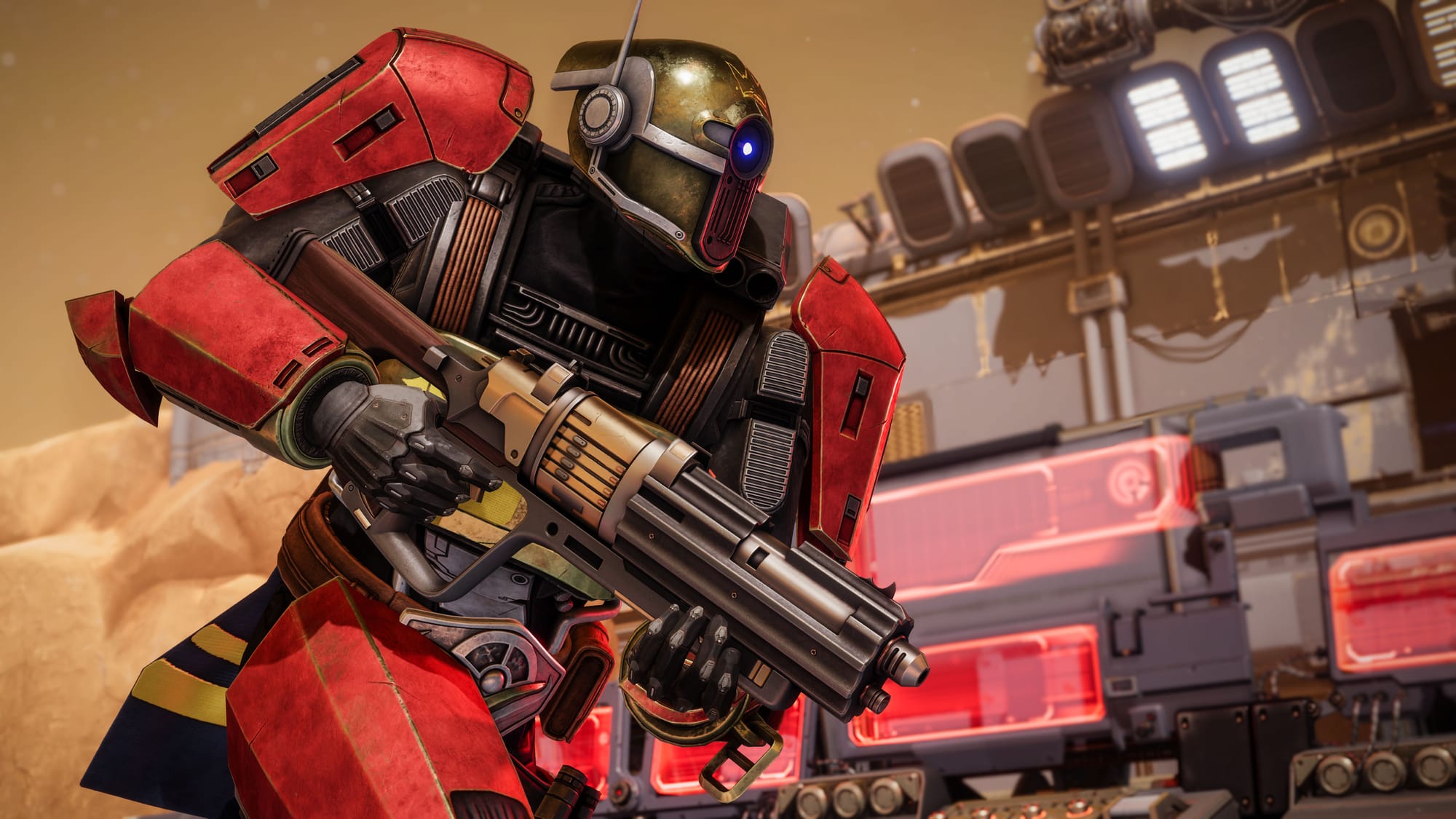
As part of a preview event for Destiny 2: Renegades at Bungie HQ in early November, I was able to sit down with two of the creative minds behind the Star Wars-themed expansion: Assistant Game Director Robbie Stevens and Narrative Director Alison Lührs.
In our 20 minutes together, the three of us covered a lot of different Destiny topics, both about Renegades and the state of the game since The Edge of Fate.
Below, you'll find our complete interview, with minor edits for clarity – or, in the case of my questions only, brevity.
Rogue: Something that's important to us at Rogue is humanizing the development process. So I'll ask you now so you have time to think about it, and we'll circle back around at the end. You guys have gotten pretty good at eating crow at Bungie with "no excuses from us, we're gonna fix it" type of stuff. But what is something that you both, from a narrative side and from a directorial side, wish was better understood in the community and gaming as a whole, about the difficulties of making games. I'll swing back to this later.
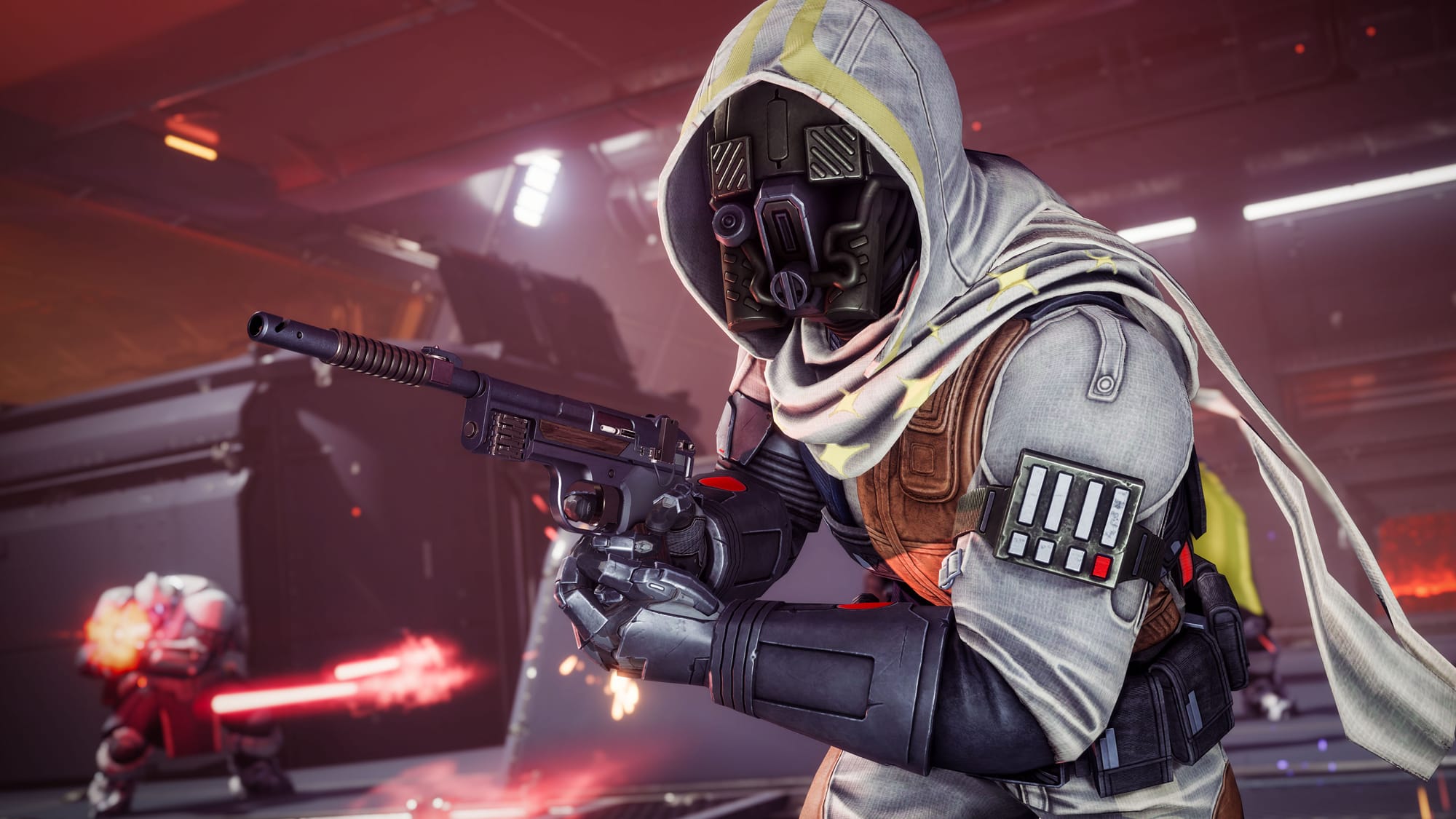
Rogue: OK. The Vidoc makes it clear that getting that perfect blend of Star Wars and Destiny was the goal from start. Ben (Womack, Destiny 2's Core Game Creative Director) mentioned when I was talking to him that there was a lot of stuff that you guys tried that didn't work, which I think is almost as interesting as what is here that blends really well. And I'm curious if there's anything that comes to mind that you guys can talk about that was like, "this doesn't feel enough like Destiny," or "this is too much like Star Wars."
Alison Lührs (AL): Sure thing. Initially when we started off this collaboration, we were so terrified about not getting the Star Wars right, and so we zeroed in on like, "okay, what is the vibe, the aesthetic, the everything of Star Wars?" Art had it easy because everyone knows what a Star Wars looks like. And sound design had it pretty easy too. We were able to use a lot of the authentic sounds that are in Star Wars. Which you can hear and it makes everything feel even better because the blaster sounds like a blaster. The Praxic Blade sounds like ... another thing that ... looks like it.
And for narrative, we were in a really weird position because "okay, we're not using the characters, we're not using locations, we're not using a lot of the concepts that exist inside of this IP. So what do we use?" One of the early lessons that we learned, no quotes. Quotes feel bad, they take you immediately out of the experience. And we want people to remain immersed inside of the game. Another easy lesson that we learned early on was that copying the beats also didn't work. If we tried to maintain the structure of A New Hope, for example, it would feel pretty Star Wars, but it stopped feeling like Drifter and it stopped feeling like Eido and it stopped feeling like Eris. And so we've managed to tool around with it and eventually landed on the right meat, the right combination of the archetypes of Star Wars made sense, filled with the characterization of destiny.
So begin with this foundation and then build something interesting on top of that. Dredgen and Bael's a really good example. We took a Revan/Kylo Ren, added some pizazz from Destiny on top of it, and we're able to make something that feels new and fresh for our IP. And it's a character that we want to take with us outside of Renegades too. We're going to see him again. Yeah, I'm a big believer in taking those things.
Robbie Stevens (RS): And even then, there's a lot of challenge I know y'all were dealing with and I remember ... I get the pleasure of looking at everything and giving feedback across the place, across the team. And I remember a few times with Alison looking at some of the stuff with Kylo. I'm like, I'm loving ... sorry, with Dredgen, who was inspired was inspired by Kylo.
AS: You slipped!
RS: I did! But I remember there's a few spots, a few dialogue deliveries, one or two cinematic moments where I was like, "Alison, we're too close and we need to push it apart a little bit." And that's been the challenge of this. But also it gives us a lot of creative fuel though. It's a lot of excitement in order to do it. It's funny that you mentioned the art side because while I think the art side in some categories has been easier – and a lot of that's because there's so much Destiny visual language that is already so good that a lot of it's like how do we turn it to love and how do we make it feel new? How do we make it feel fresh? Even on all the maps around the Lawless Frontier on Venus, Mars and Europa, we had some early executions of those where they weren't hitting those postcard key set pieces that you would expect from the inspirations we're pulling from.
And it wasn't like a matter of like, "oh, those visuals are so important because they must be there in order for players to feel it." Actually the core problem was it didn't feel unique enough. These are new locations, we want them to feel new, we want them to feel fresh. We want them to feel changed and different because of the Barant Imperium being there or the Pikers being there or Tharsis Reformation messing around. And so even though there was a piece of like, "okay, we can creatively execute on this by using the homages and set pieces and leaning into them," a lot of it was actually through the lens of how do we make them feel new? How do we make them feel fresh and exciting to run around in? And so yeah, there's been a lot of fine tuning for a very, very long time, but the team really did find their rhythm after a while. It took a lot of ...
AL: Iteration! Trying stuff out.

Rogue: When you're trying to tell this big, overarching story after The Light and Darkness saga ends after 10 years, and you're trying to start something new ... there's a reality where, from a narrative perspective, you're like "great, this Star Wars shit just got dropped on us, how are we gonna mix that in?" What was the process of still trying to make sure the Destiny story mattered? It seems like the goal was to make sure the story of The Nine didn't feel like it was on hold while we deal with Star Wars Man and his Star Wars Problems. So what do you do when you get the task of "OK, time to fit something unmistakably Star Wars into the middle of the story you're already making?"
AL: You start by pattern matching. You start by looking at the two things that you need to make work together and you find the stuff where it overlaps. You find the little parts that are talking to each other. For, "okay, we're doing a Star War" and I'm looking at the Fate saga, there's a lot of commonalities between the theme overall. But also in between the small things that we want to talk about. Giant cosmic questions about what does fate mean is something that's deeply applicable to both of our IPs. So great, that already works. We can also look at things that speak to Destiny and go, "okay, if it works with Destiny, how can we make it work with the Fate Saga?" Dredgens are a really good example of that.
RS: Yeah, we wanted to bring the Dredgens back well before Renegades, well before the collaboration.
AL: Couldn't find the right time for it. Couldn't find the right reason. And then this pops up and, like, hot damn. There we go. We need a Sith to feel Star Wars-ie. We need a Dredgen to feel Destiny-ish. And once we've got that thing in Destiny, we can find a connection to the Fate Saga. We were planning Renegades at the same time as planning the Fate Saga overall. So this wasn't a thing that was tossed in like "no, now we have to make it work!" It was an opportunity. It was already there. So we built around it and built into it, if that makes sense.
RS: I love the comparison points you're talking about because literally even before we were talking deeply about story and stuff with Lucas, one of the first pitch decks we actually created and sat down and I remember showing around to Allison and a bunch of people to see how they're feeling, but I was like, I sat there and I grabbed Lorentz Driver, the Exotic weapon, one of its ornaments has this metal and wood look and I put that next to the Mandalorian's sniper rifle. And you're looking at, you're like, "those materials feel so close." A screenshot of Drifter with his arms crossed in front of the gambit Moat bank and then Han Solo in front of the Millennium Falcon in the Hoth cave. That's that classic cinematic shot from Empire Strikes back. Jabba The Hutt next to Spider side-by-side. And we're sitting there, we're going like, "we're so close."
And so it was one of these things where it was ... you talk about rhyming with patterns and other things and so from the earliest ideas that we were kicking around with our collaborators, with Lucas, that was at the heart of a lot of it. It was just finding that Venn diagram and that overlap.
AL: I want to emphasize the most important part was making sure that we weren't negating anything that the player believed about the world. That we weren't telling them like "haha jokes on you. There's always been Darth Vader here." We didn't want to surprise them and tell them, you fool for paying attention. And that's something that makes you feel like the thing that you believe is wrong.
RS: We want to have surprising moments that leaned into the Destiny story.
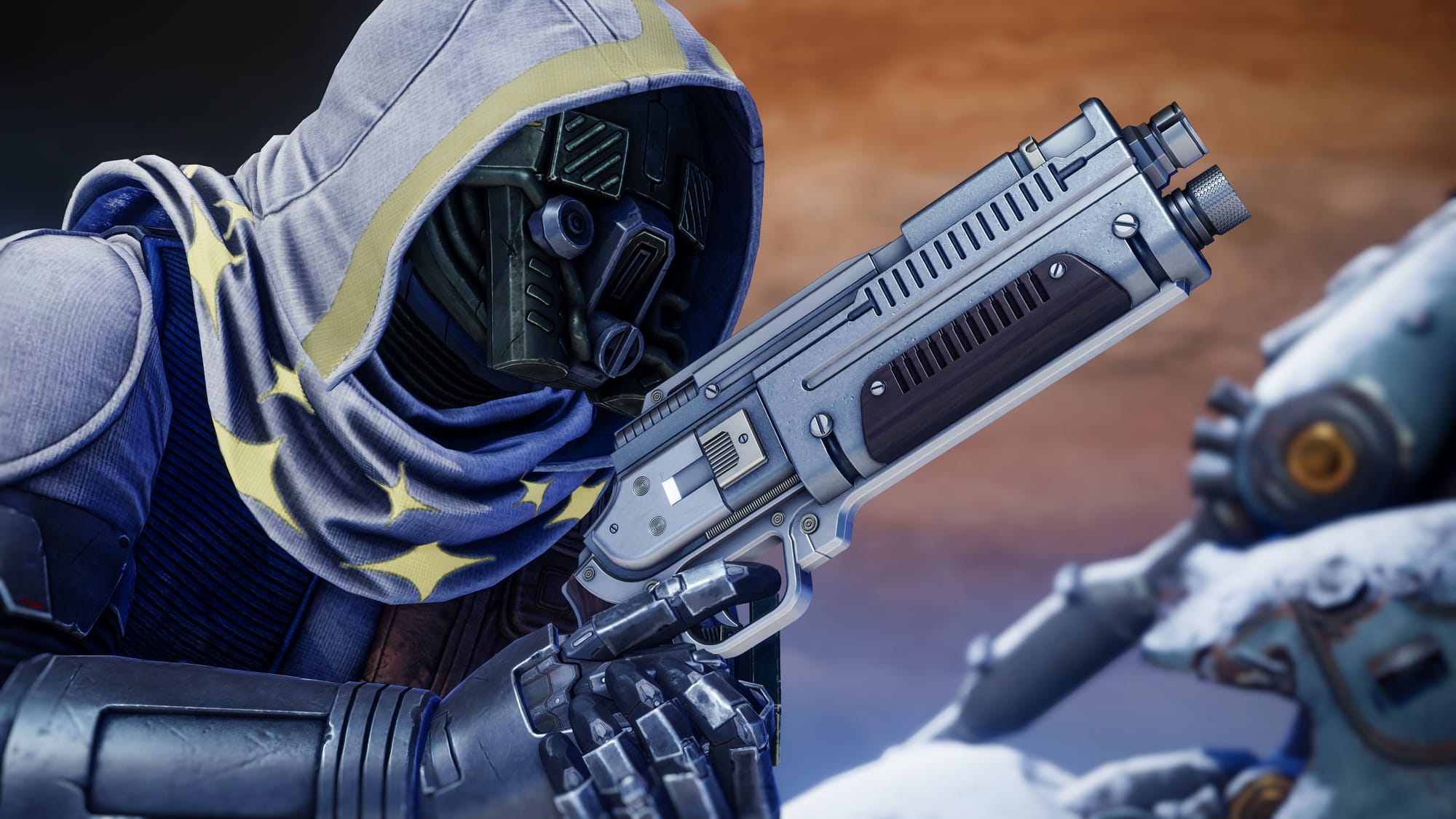
Rogue: I know you said no direct quotes, but what are the chances that this whole thing ends with somehow Emperor Calus returned? I'm the only one who's hoping for that.
[Robbie laughs]
AL: I promise we've made that joke internally a thousand times.
Rogue: Yes! Okay, very good. Glad to hear it. That's not a no.
RS: He already returned once, technically.
Rogue: Yeah, but he's the best.
AL: He is the best. I miss him too.

Rogue: I'm somebody who enjoys the logistics of things. And so I'm the person who's like "where is the Marvel book that talks about the logistics of The Blip and the infrastructure that got broken down from that. And so, similarly, I enjoy thinking about things like "why are certain Guardians like Osiris old, whereas Drifter is young even though he's a much older Guardian.
AL: I'm so glad you're asking about this.
Rogue: And now Drifter is old. I know he and Eris are together, but usually happy people put on weight, not extreme age. So – and I imagine it's something to do with being exposed to the singularity of Three in The Edge of Fate – but what is the process of permanently aging a Guardian so even on resurrections they come back old.
AL: The Nine can do things that the Light can't. The Nine control the rules. They are the rules. And that includes the rules of paracausality as well. And so what that means is that in that moment where he got too close and became "Nine-touched" as he calls it, he managed to kind of side slip through time a little bit and get around those rules that are set in place by The Nine by happenstance. We wanted, narratively, to have something happen to him physically to show the impact that this moment was going to have on his character. It's why we start off Renegades with him in a place of anxiety and searching. This doesn't feel like a Drifter who's got all of his shit together because he doesn't.
RS: He's very disturbed by the visions he's been given.
AL: Yes. And by his realization in Edge of Fate that people aren't the ones controlling fate. There's something else that's bigger than us. We wanted to show that visually. We wanted to represent that in the lore. And we wanted to demonstrate that The Nine can be more powerful and have impact over paracausality in a way that we didn't understand before. And that's reinforced by events that happen in Renegades.
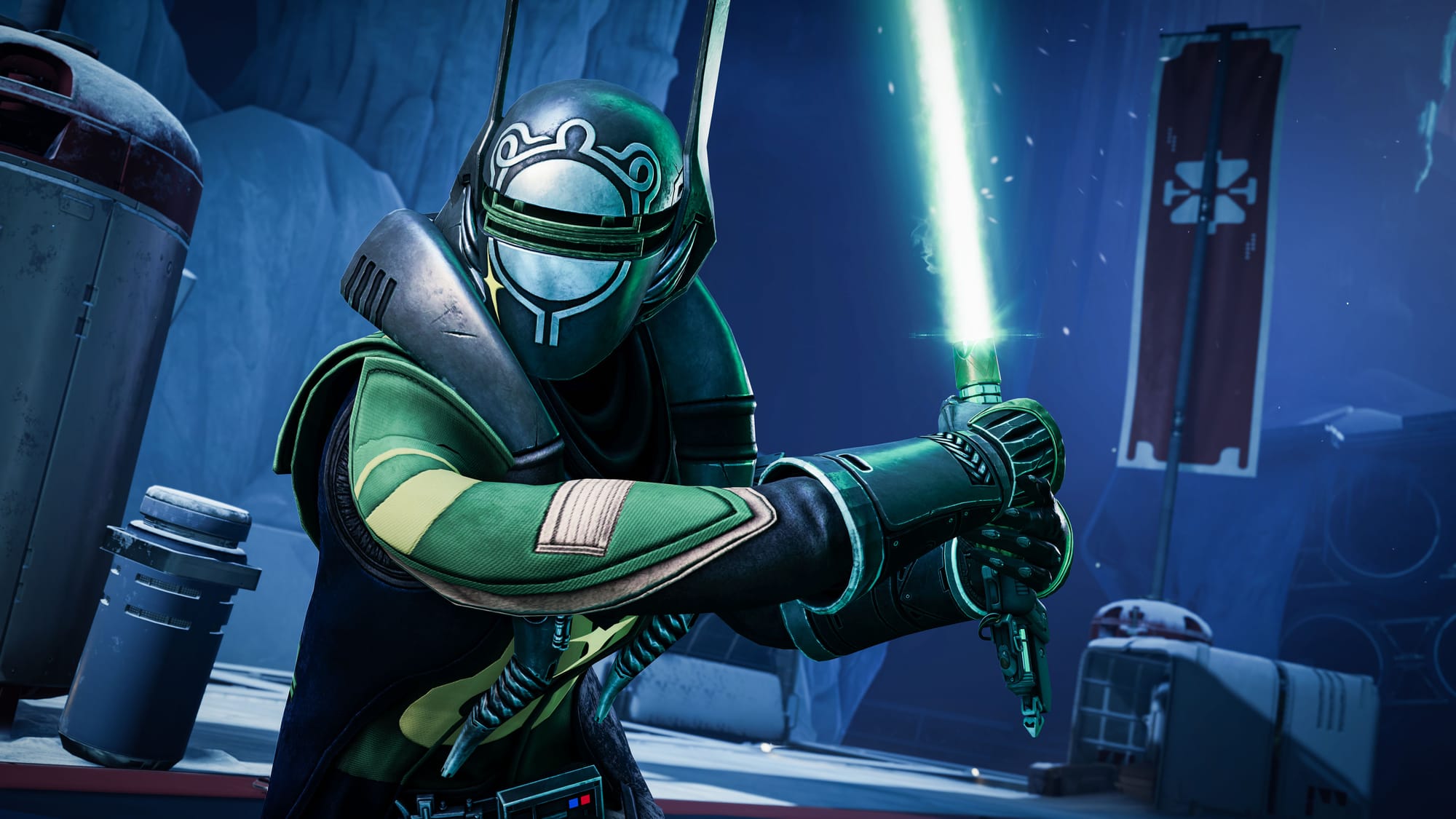
Rogue: I feel like something that people are curious about that has to be addressed. I know it's complicated because of staffing issues and things that have happened in the past year, but this feels like a time where the game is more unstable than it has been in a while. You've changed a lot in the past six months, and I know that can create issues, but when you're asking people to spend a lot of time grinding for something, hitting that bug wall feels that much worse.
Understanding that there is a cost to bugs both in terms of player sentiment and in terms of dev time, is there anything you can say to assure players that this is because you were moving very quickly or is this something that, in order to get new stuff in this current age, it's just something people are going to have to accept that the game is going to be a little buggier?
RS: So I mean I think Edge of Fate, Year of Prophecy, and Renegades, the entire year here, a big part of this was people wanting change, asking us to make changes to the game, asking for new things to do, new things to explore, new loot, different ways of even playing the game too. And so change is messy. And the thing that I think we will own and acknowledge is there's probably parts of the game where we went too far, and we changed too much too quickly. And with that comes a tax and that tax is how much we need to then react to those things that aren't working for how much we changed. Now there are things that have I think gone pretty well, right? There's the armor stat changes, the set bonuses that come from them. Tier Five weapons themselves feel hot even though we've created a new problem because we've sped up so much of the progression that we need to find new exciting chases.
And we are clearly trying to do that. You're seeing it with the blasters and the Praxic blade having a ton of customization, gameplay and cosmetic depth there. Having more just cosmetic pursuits inside of Renegades all up with each of the syndicates, which is not something we had in the Edge of Fate at all. And also, y'all seen it yet because we want everyone to experience it and see it for the first time, but we actually are going to have these alternate delighter perks on blasters as well. So even if you earned a Tier Five blaster, they're still going to be a pretty deep chase to earn the alternate origin perk versions that are going to be a new perk, super hot for them as well. And I'm only hiding this as there's some stuff coming very, very soon because a lot of that is in direct reaction to changes we had to make because of how fast we had to move in order to start to right the ship on the speed of progression and how it feels. And so I think the reality though still remains in order for the game to continue to evolve. And we're trying our best in order to make it feel different in the right ways and change in ways that are somewhat sustainable for us developers. But also frankly, our main goal is just excitement and fun for players.
There are going to be bumps in the road. It's going to happen. There's more bumps than we wanted. And like I said, a big part of that is we acknowledge we probably changed too much. We probably should have tried to innovate a little less and focused a little bit more on smaller bites at the apple. So definitely acknowledge that.
Rogue: Very cool. Okay, so ...
RS: Sorry. I do need to say though, just because such a big spot, I think you've seen, Ryan, we've been deeply committed to trying to move as fast as we can and we're not letting up anytime soon in that regard.
Rogue: You move fast and sometimes ... [this is where I realized I almost quoted Mark Zuckerberg on accident] things break. I'm not gonna do the actual quote. I refuse to do that.
AL: No quotes.
[Everyone laughs]
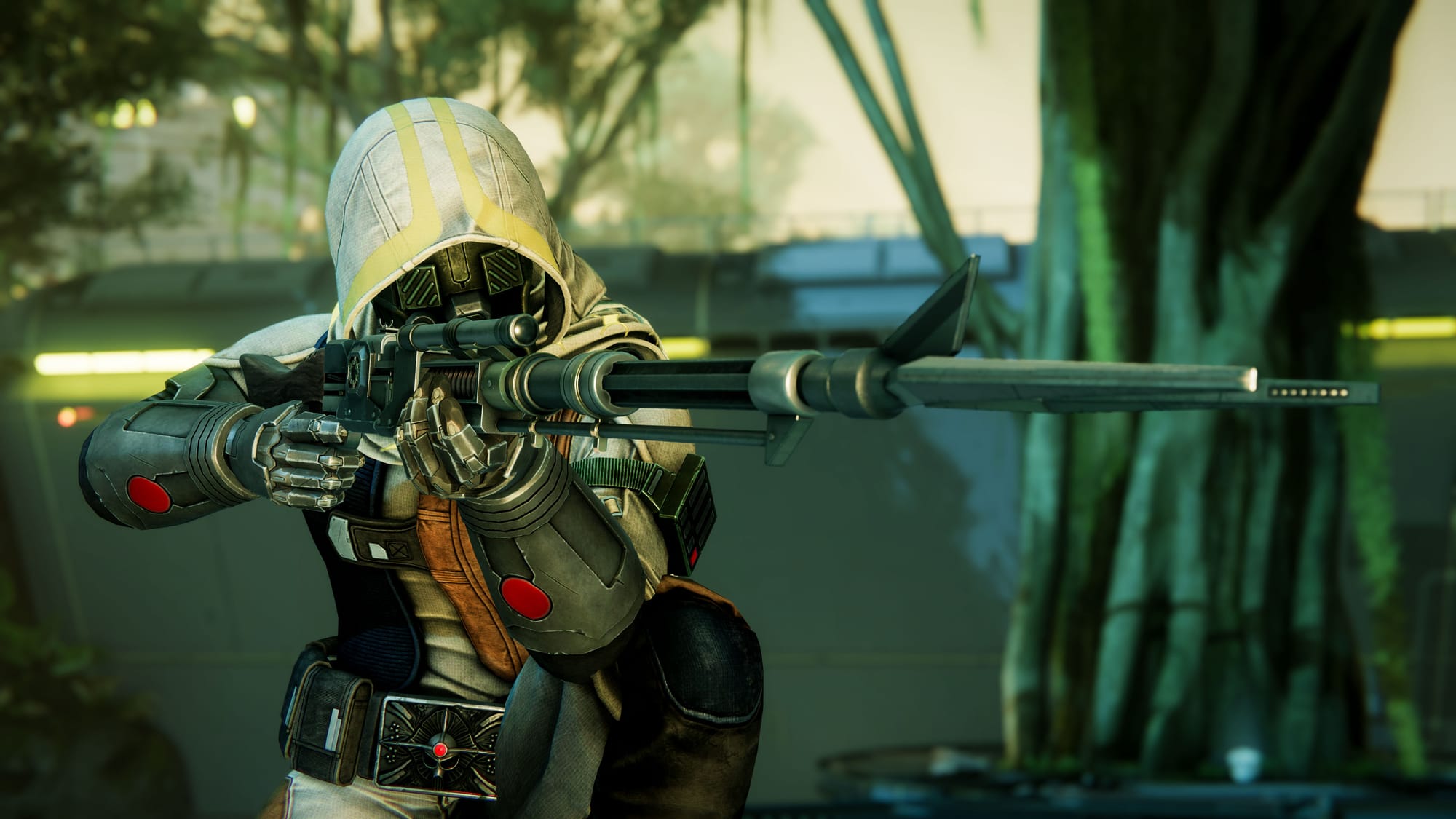
Rogue: I think this is my last question, so let's circle back around.
Destiny players are ... let's say "passionate" and get angry very quickly – lots of gamers do that. And I think there's so much that could be understood that isn't about the process of making games and why the "just fix it like this, Bungo" solutions don't always work. So is there anything that you've come to that would be good for people in the community to know about game development?
RS: I think the main thing that I think anyone can understand, you don't even have to be a game developer. If you're like, let's use a metaphor here. You're like you have a hundred dollars and you have to make the choice of what do you buy with that a hundred dollars to make the best possible meal for your family, your friends or whatever. But you know what, you only have half a day to do it. Go.
I think a lot of things that people don't understand is that even though we do a lot of planning, we do as best as we can to stay ahead of the curve of how people might react to something, do a lot of theory crafting of the decisions we're making. At the end of the day, you only have so much time, so many resources. And on a game like Destiny, it's a big game. We've been doing this for a while. Expectations are pretty high, rightfully so. Rightfully so. People should expect awesome Destiny content from us and we want to deliver as best we can. It's just sometimes that reality of how much time we have to truly cook, to truly react. And then, at the same time, if things are struggling in the live game and the right thing to do by players is to react to that and do our best to react immediately, that does come at a cost, and that cost is some amount of future work that we're doing we now have some amount of less time for. I do not expect anyone who plays Destiny to accept that as an excuse or a reason for us to not make changes or whatever because I think it's still on us in order to do the best that we can with all the great people we have on the team at the time we have. But it's just a reality we have to live in.
AL: Mine feels more myopic since I'm speaking strictly to just stories. Sometimes our job is to make something make sense more than it is to be the ones unraveling a grand tome of perfection. Sometimes our job is to take something that's a part of the play experience and just make it something that you can wrap your head around rather than "we designed this perfect story experience to unravel from the very beginning. It is perfect from top to tail." Games is a unique medium in that we don't have a singular person whose singular brain is deciding what everything looks like.
RS: It's very different than movies in that way.
AL: It's very different from movies and TV. Exactly. We're collaborative. This is a structure that is dependent on 400 people all managing to work together to make something. And sometimes that means that you have to live in a society [laughs] and that means working together.
RS: And it comes with a lot of positives, a lot of people being excited about ideas and then finding the best ideas by working together. And sometimes it's a struggle because one group is like, "I really care about this." And we're like, "we know, but the player, it's hard for the players to understand it or feel it. Right? And we're just not hitting the bar, so we need to work on it so that it's about the player first."
AL: And sometimes that turns into magic, right? The decision of "we're going to do this collaboration" is something that we got told and we're like, "okay, what does that open up for us?" And it opened up a lot of really, really cool stuff.
RS: It really did. I mean, I think I said it before, but it was so much fun, creative fuel. But through that lens of "players are asking for change." People want to see different things in Destiny.
AL: Let's surprise them.
RS: And so that was at the heart of a lot of everything we did, pretty much.
AL: We wanted to hit the assumption of what a Destiny game is and we wanted to surprise them.
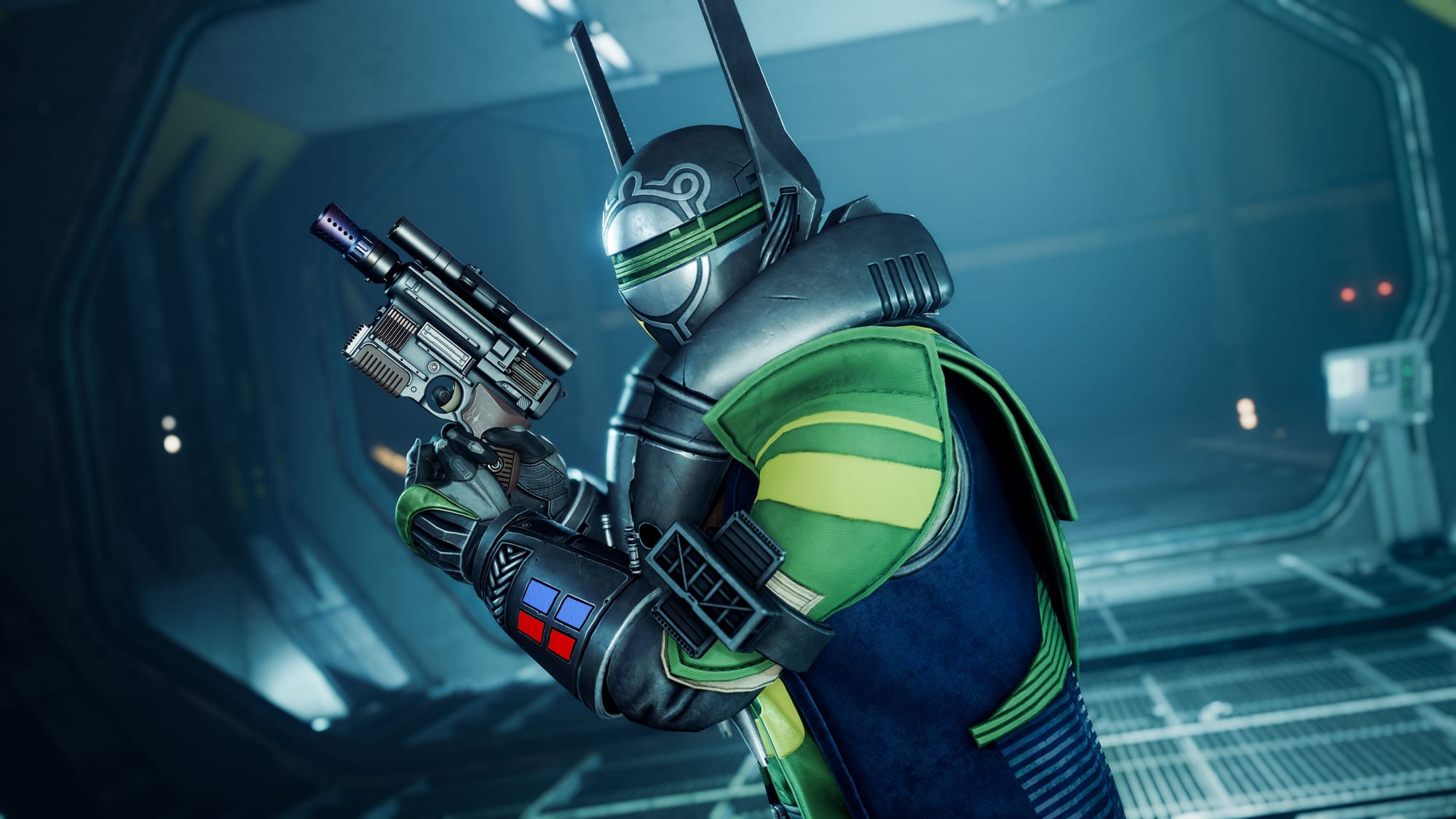
Rogue: [I was told I could ask one more "quick" question] You spoke a little bit about it, but the righting of the Great Ship Destiny is something that takes time because you have 400 people that'll have to move, but the movement was pretty fuckin' quick. In terms of how long I've been following the game, this is one of the faster times I've seen you guys move to overhaul systems.
[To Robbie] What is the process of making those logistical decisions of "we're going to pull people off of doing something that's coming in the future to move them onto a fix for the live game." What is that process, from gathering feedback from the community team, etc.
And [to Alison], when the game is mildly on fire, how much does that impact what you guys are doing on the narrative side. How much does that impact your day-to-day?
RS: So it probably impacts mine a lot.
[Everyone laughs]
Compared to Alison. It still hits Alison.
AL: We're both impacted [laughs].
RS: Sorry, I just mean on the day-to-day.
Bungie PR: [Sarcastically] I said quick question ...
Rogue: [Sarcastically] You gave me another question ...
RS: The best way I can answer this is we take inputs from everywhere. We take inputs from the community team, we read the internet ourselves ...
Rogue: Sorry.
RS: It's the reality! And we formulate the plan based on both that hard data and anecdote data that we're getting. And the reality is, yeah, sometimes there's something being said somewhere in some corridor of the internet or whatever, and then we look at the data and we're kind of going out and it's like "they're saying it, but the reality is, is this really true? Is this really a problem or not?" At the same time though, sometimes reality doesn't matter and it's more about the perception of the problem.
And a lot of game design and creative is about feel, right? And so even though we're trying to take all these data inputs, there is still a feeling aspect to all of this that we have to take and account for. And so myself and Allison and all the leaders at Bungie and Destiny and others, we are so deeply committed to trying to be that player-first, great experience that even though sometimes the data might be saying, "well, what they're saying is wrong," the right thing to do is still to make a change. Even if it maybe erodes a little bit of opportunity in the future to make people feel better now because that's the right thing to do by the community.
AL: Good game making is listening. It's listening to your players. It's listening to what the game is telling you. It's listening to what your team is telling you too. Even though you (Robbie) are dealing with different fires and I am dealing with different fires, narrative is the most flexible discipline. Our job is to be bendy and to be able to move and change when some of our other disciplines can't. And so when things are shifting around, we are there to match because we're good at our jobs.
RS: And when I said that [meaning that it impacts him more than narrative], I was more meaning like from a shield perspective. I do try to shield in my role.
AL: And you do a great job!
RS: I'm like "I try to shield where I can." Right. So the team can really focus on just doing awesome work and making cool experiences.
AL: No, it's OK [laughs].
RS: But yeah, even on the narrative side, the thing Alison ... I immediately, as soon as The Edge of Fate came out, literally day one we're talking back and forth about, "looks like Lodi is a hit" or look like that "maybe this didn't hit as hard as we maybe thought," or "oh, here's an opportunity that players are latching onto. Maybe we should pull at that string a little more."
AL: Constantly talking and constantly listening.
Transparency note: Bungie provided travel accommodations for the visit to their headquarters. However, there are no restrictions from Bungie on how critical we could be of the content we saw at the event. Bungie did not review or demand edits on this interview before it was published.



